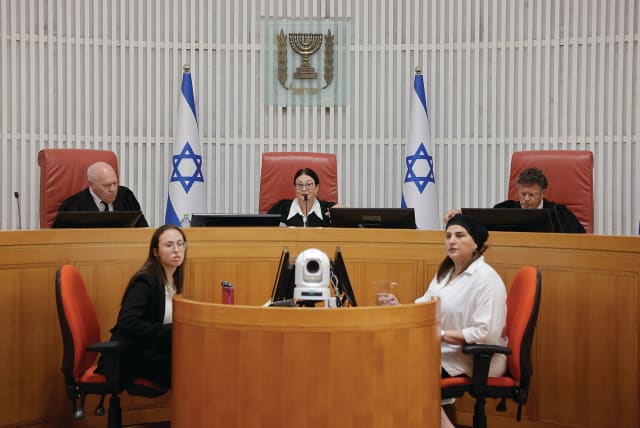Right, Left file amicus briefs ahead of reasonableness law hearing

The left-wing NGO the Israel Law Professors' Forum for Democracy and the right-wing NGO Im Tirtzu both filed amicus briefs ahead of the High Court hearing on the reasonableness law/
Ahead of the High Court of Justice hearing on petitions calling for the striking of the judicial reform's Law to Cancel the Reasonableness Standard, groups on the Left and Right have begun to file amicus briefs with the Israeli Law Professors' Forum for Democracy and Im Tirzu both submitting their documents on Sunday.
The Law Professors' Forum applied to be amicus curiae, a group not party to the case but offering vital context and expertise to the court, against the reasonableness law because it represented almost 150 law experts from Israeli academic institutions and had created a comparative research document that examined the flaws in the legislative process to pass the basic law amendment.
Basic laws should be advanced carefully and with greater review than normal legislation, the forum argued, saying that their research showed that the preparation of bills in the committee had involved more preparation and bipartisan cooperation. The bill was rushed using a committee bill format, rather than a private bill, allowing it to bypass a conventional preliminary reading and a 45-day waiting period.
The anti-reform NGO argued that these measures represented an abuse of the Knesset's constitutional authority in a way that harmed the independence of the judiciary and core democratic characteristics of the state.
The attack on the judiciary was part of a broader political agenda, which is why the reasonableness law should not be reviewed on its own, but in the context of a wider legal overhaul, said the NGO. The agenda, along with the procedural and substance defects demanded that the court strike down the basic law amendment.

What did the pro-judicial reform arguments say?
Im Tirzu argued in its amicus brief that the court had no authority to strike down or review Israel's quasi-constitutional basic laws. The court has never struck down a basic law or amendment, and while many of the current justices have expressed the belief that they have the power to do so, the ability is hotly contested.
The right-wing NGO said that it had assembled a document exploring studies from Israel and around the world that disputes the attempts by petitioners to argue that the court had the authority to strike the reasonableness law. The organization said that accepting the petitions would ruin the democratic balance in Israel, shifting the center of gravity from elected officials to unelected courts.
"These are fateful petitions that will decide whether in the State of Israel the people are sovereign, as in all democratic countries, or not," said Im Tirzu's attorneys. "After the court allowed many left-wing associations to claim that it is authorized, for the first time in the country's history, to repeal a basic law, it is essential that the voice of the nationalist civil society be heard as well."
Yisrael Beytenu MK Yulia Malinovsky filed a document in support of petitioners on Sunday, focusing on the impact of the restriction of the reasonableness standard on state security.
Malinovsky said that without reasonableness, IDF soldiers and officers would be vulnerable to international criminal proceedings in states that exercise universal jurisdiction. Since the reform was first proposed in January, critics have argued on the issue of complementarity, which holds that international legal forums must defer to local courts if they are independent and fair. If the independence and tools of the Israeli courts were to be degraded, the International Criminal Court may believe itself to have the right to review accusations against Israelis, anti-reformists have said.
The Yisrael Beytenu MK said that there wasn't a proper review of the impact the law could have on the international stage.
The Law to Cancel the Reasonableness Standard, passed on July 24, restricted the ability of the court to engage in judicial review of administrative decisions of the government and ministers by deeming them beyond what a reasonable and responsible authority would decide.
The hearing for the reasonableness law is set for September 12, and respondents have until the 3rd to respond to the petitions. On Friday, the attorney representing Prime Minister Benjamin Netanyahu, Justice Minister Yariv Levin, and the government filed a request for more time to prepare his arguments.
